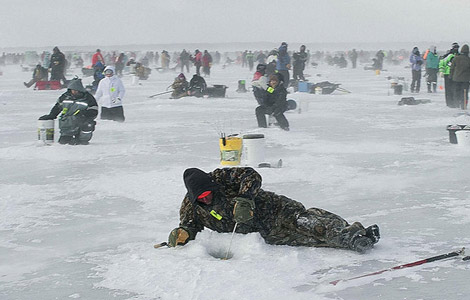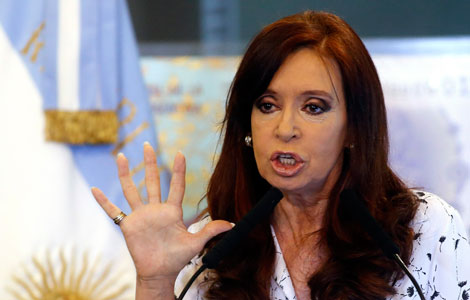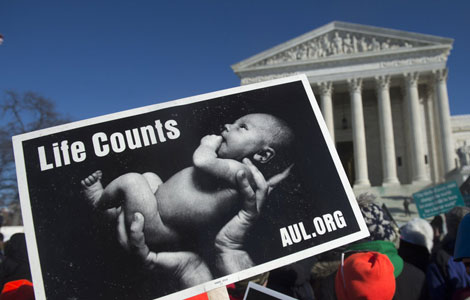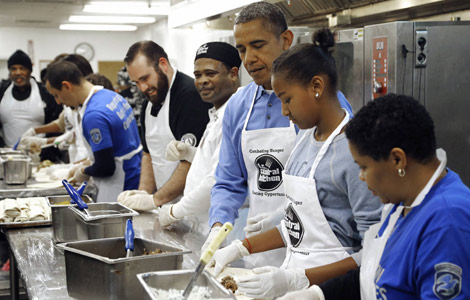

MONTREUX -- The international conference on Syria opened Wednesday was shadowed by clashes and accusations on the first day.
Bashar Jaafari, Permanent Representative of Syria to the United Nations, told journalists he was disappointed at the format of the ministerial meeting. Most of the 40 participants were "anti-Syria delegations", and their speeches "provocative and repetitive statements based on hatred towards the Syrian government", he said.
A preliminary list disclosed less than 30 countries attending the Geneva II conference, apart from organizations. "They added 10 more countries but excluded Iran," Jaafari said.
He slashed the meeting as failing to encourage national political dialogue, and "counter-productive, not positive at all". "We need hope to put an end to terrorism," he said.
Earlier at the meeting, Syrian Foreign Minister Walid Muallem urged international community to "stop supporting armed opposition" in the country, noting that some countries attending the conference had "Syrian blood on their hands".
He also accounted atrocities of the extremists, and accused those who, under the cover of revolution, trying to fan up tension in the nation.
The speech was followed by criticism from Ahmed Jarba, head of Syrian National Coalition, the country's main opposition bloc, against killing of the government. "Mass killings continue in Syria. Can one stand? This is not our choice to bear arms," he said.
But a real focus of the disputes between two sides was the role of Syrian President Bashar al-Assad.
Muallem said upon his arrival to Geneva Tuesday evening that subjects related to the status of the president are "red-lines" and cannot be touched.
"Nobody in this world has the right to withdraw the legitimacy of a president or government ... other than the Syrians themselves, " he said.
But Jarba demanded establishment of a transitional government. "For the Syrians, time is now blood," he said.
This was echoed by John Kerry, U.S. Secretary of State. The President has lost legitimacy, he said. "You can not save Syria as long as Assad remains" he told media at the press conference.
The clashes and accusations further dampened the hope of people to make breakthroughs and end the conflict at the conference, after the last-minute threat by the opposition to pull out of the talks in protest against UN Secretary-General Ban Ki-moon's invitation to Iran, an alliance of the Syrian government.
But many participants deemed it a positive sign anyway, as for the first time in three years, warring sides finally agreed to sit down and talk.
"It is not easy to sit around the table after so much bloodshed and destruction," said Ban who had chaired the conference on Wednesday.
"Almost everyone with a means to influence the cause of this country were in the same room, under the auspice of the United Nations. That moment is historic," he said.
Kerry called the conference a "beginning". "It's a beginning of what will obviously be a tough and complicated negotiation; peace talks to end a war and to end a struggle like this always are tough," he said.
Russian Foreign Minister Sergei Lavrov urged participants to "do everything to help the Syrian government and the opposition to pool efforts with the objective of eradicating terrorism".
While Chinese Foreign Minister Wang Yi told participants that the path of peace talk between different parties from Syria is bound to be tortuous with twists and turns, therefore confidence, patience and persistence are needed so as to find a middle way.
The Syrian government also expresses good will. "We hope to reach an agreement with the opposition," said Syrian Information Minister Omran al-Zohbi during an interview with Xinhua, although he said it would not be easy. "To produce a solution and political process needs time."
Another step will be taken on Friday, when the two Syrian parties will be engaged in talks chaired by joint special envoy of the UN and the Arab League Lakhdar Brahimi, which is a more difficult task.
Brahimi said he was going to meet both parties separately on Thursday to see if they should go straightly to meetings or continue talking separately. "We have a roadmap in the communique," he said, wishing that the schedule on Friday wouldn't change.







